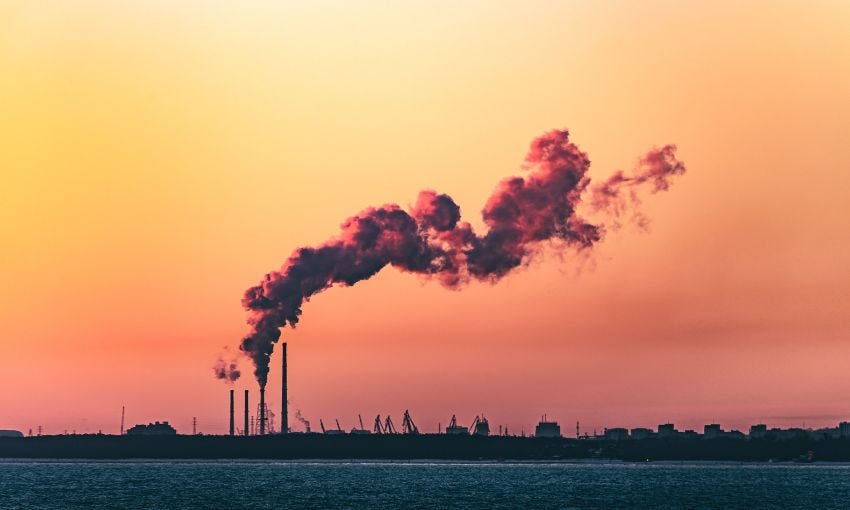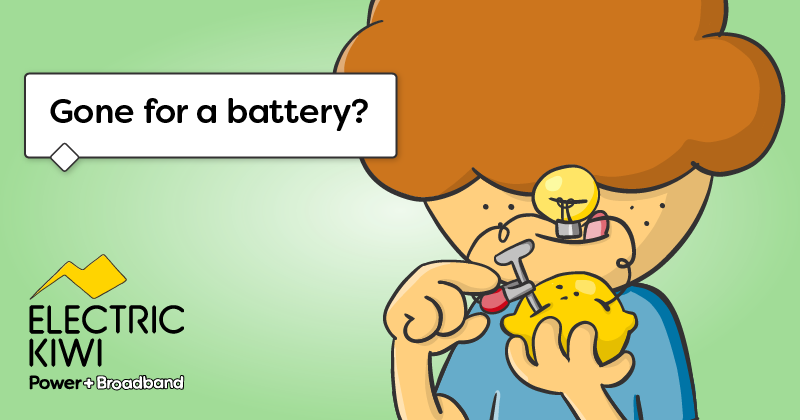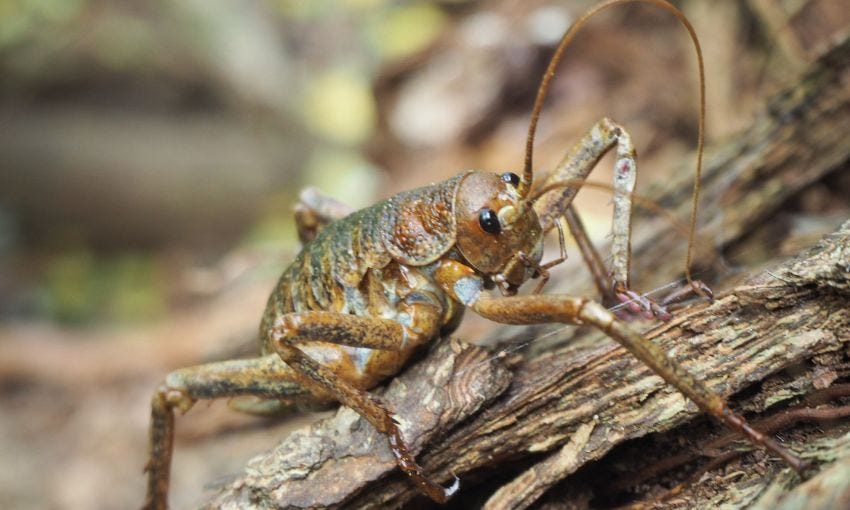'The sham must end'
Loopholes in emissions reporting ‘wide enough to drive a diesel truck through’: the latest from Cop27
Kia ora, welcome to Future Proof, brought to you by Electric Kiwi.
Global climate negotiations continue to sputter along in Egypt this week at Cop27. I’ve rounded up the latest and best coverage.
Expert group releases report on corporate greenwashing
A UN expert group, including the Climate Commission’s Dr Rod Carr, has released a detailed report on corporate net-zero pledges, finding widespread greenwashing. This comes as more fossil fuel delegates than ever attend the Cop meeting. The report recommends standards to strengthen net-zero pledges and claims. Newsroom’s Marc Daalder breaks down some of the details. UN Secretary-General António Guterres said of the report’s findings: “It is rank deception. This toxic cover-up could push our world over the climate cliff. The sham must end.” He added that loopholes in corporate emissions reporting rules are “wide enough to drive a diesel truck through”. (Here’s a helpful guide to identifying climate delay arguments used to misdirect or slow climate action.)
Carbon emissions return to business-as-usual after pandemic dip
The annual global carbon budget has dropped, and it’s not good news. The world is back to record fossil fuel pollution, surpassing pre-Covid levels this year. This budget most definitely under-reports emissions, as it relies on self-reported data and omits methane, which is an even more potent greenhouse gas than carbon dioxide. If we continue on this trend, we’ll hit the 1.5C threshold in just nine years. New Zealand hasn’t quite rebounded to pre-pandemic levels yet, but it’s too early to say whether we’ve peaked either, Eloise Gibson reports for Stuff.
New satellite system will out methane leakers from space
The UN Environment Programme launched a new Methane Alert and Response System (MARS) to track methane emissions from space. Once detected, companies will have 45-75 days to sort their leaks before the data is made public – a kind of “shaming tool,” according to the head of the International Methane Emissions Observatory. At first, the satellites will focus on major leaks but will eventually suss out emissions from livestock and rice farms too.
Another satellite-based analysis is pinpointing individual polluters
Meanwhile, the nonprofit Climate TRACE (backed by former US vice-president Al Gore) has released a compendium of more than 72,000 emissions estimates for individual factories, power plants, livestock feedlots and cargo ships – using data collected via satellite. This type of granular emissions accounting could help guide decision-making and focus actions where they’re most needed.
Nice one. Batteries are a great way to flatten your energy usage to avoid peak times and to save solar generation for busy periods of the day. But are you getting the most value from yours?
With the MoveMaster plan, you have a huge opportunity to maximise cost savings by using off-peak periods to charge, which can also reduce your impact on the environment. For guidance, click here to find out how to optimise your battery for more efficient power usage.
Electric Kiwi is working directly with customers with batteries to analyse usage and to conduct trials on battery optimisation. If you’re an Electric Kiwi customer and would like to be part of these trials, get in touch by emailing batteries@electrickiwi.co.nz.
More Cop27 coverage
Vulnerable states continue push for climate funds
Last week we talked about small island states and vulnerable nations calling for ‘loss and damage’ funding. The New York Times has some nice graphics illustrating the concept and, Christina Laalaai-Tausa relays the harsh reality of climate change in Sāmoa.
New Zealand labelled ‘fossil of the day’
New Zealand has shuffled up a few places in the Climate Change Performance Index while the Climate Action Network International awarded New Zealand ‘fossil of the day’ at Cop27.
We have a plan for the planet. What about a plan for people?
A new network of organisations who have joined forces to advocate for mental health to be an integral component of adaptation to climate change.
What’s on the menu for a climate-friendly diet?
In an earlier edition of Future Proof, I chatted to Dr Cristina Cleghorn about her research investigating sustainable, healthy and budget-friendly diets. Her latest research has recently been published, showing that the “optimal” Kiwi diet has a heap of veggies, fruit, a bit of bread and small amounts of fish. The analysis didn’t take into account cultural, social or personal food preferences, but if we all ate according to this diet, the country would save $20 billion in health costs and gain 1.4 million more healthy years of life, as well as eating within our greenhouse gas “budget”. Earlier data generated by Cleghorn and her colleagues at the University of Otago has also been used by meal subscription service MenuAid. If you’re feeling adventurous, National Geographic suggests delving into the culinary world of algae for some climate-friendly snacks.
Bye bye, fossil-fuelled motor vehicles
New Zealand is absolutely frothing over electric vehicles, according to new research. Sales of new low emissions cars are set to overtake their petrol-powered counterparts mid-next year. Justin Lester asks ‘Is the petrol car as dead as the dodo?’ on The Spinoff. In another excellent transport take on The Spinoff, George Weeks uncovers the hidden costs of “free” roads and parking, which end up wasting our time and stressing us out.
Soft plastic recycling stalls across the ditch
The soft plastic recycling scheme in Australia, called REDcycle, has ceased operations after it was revealed it could no longer process material they were receiving, and were instead stockpiling it. But this failure may have a silver lining, presenting an opportunity for a new system that places the onus for sustainable packaging on manufacturers and retailers rather than consumers. New Zealand’s soft plastic recycling company, Future Post, told RNZ they don’t have issues here and that the system is working well. Future Post turns soft plastics into fence posts.
The stories we tell about climate change and the environment matter. I've been writing The Spinoff's weekly Future Proof newsletter since July, sharing hopeful but honest news about the climate and our natural world. It's rewarding work – showcasing the people, mahi and solutions that will help us navigate the climate crisis.
I feel so lucky to have a dedicated space to connect with readers like you, where we can kōrero with hope instead of doom and gloom. Too often newsrooms and media publications relegate environment and science to the sidelines, but through Future Proof, The Spinoff is giving te taiao the attention it deserves.
If you care about empowering climate and environmental journalism grounded in evidence, please support our work by donating today.
More stories:
New bill slated in France would require carparks with more than 80 spaces to install solar panels.
New gene modification tool that could eradicate mice tested in world-first trial.
An Aussie doco follows the construction of a super-eco-friendly house and urban farm in Melbourne – think gas generated from human and food waste, and shower steam used to grow mushrooms!
Earth’s human population has now exceeded 8 billion – National Geographic explores what this means for the planet, and us.
Could seed banking help safeguard our critically endangered native plants? The Detail podcast speaks to Marcus-Rongowhitiao Shadbolt to find out.
Thirteen North Island brown kiwi have been released into their new home in the southwest of Wellington, thanks to the Capital Kiwi Project’s network of 4500 stoat traps paving the way for their safe return.
It looks like someone has stolen four albatross eggs from Dunedin’s breeding colony. If you’re wondering why someone would do such a thing: illegal egg collecting is a very real obsession.
A lovely wētāpunga I met on Ōtata Island in the Hauraki Gulf Tīkapa Moana. Image: Ellen Rykers.
To end this edition, I’m tossing up who to vote for in the inaugural Bug of the Year competition, organised by the Entomological Society of New Zealand. Twenty-three nominees are in contention, including a native bee, a giant dragonfly, and a moth that’s patterned like a zebra. I had a prickly stick insect show up outside my house (door knocking for votes?) on the day the competition opened, but I’ve also had memorable encounters with wētāpunga and a friendly black tunnelweb spider named Greta, so it’s gonna be a tough choice! Which bug will get your blessing?
🐝Take it bee-sy,
Ellen
Got some feedback about Future Proof or topics you’d like covered? Get in touch with me at futureproof@thespinoff.co.nz














Thanks for the heads up about Bug of the Year! I love the puriri moth - they're very spectacular. Will look through these with my kids to learn some more. I don't think the sandfly will be very popular...